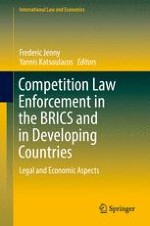2016 | OriginalPaper | Buchkapitel
The Nature and Use of Economic Evidence in Competition Enforcement (with Special Emphasis to the Case of South Africa)
verfasst von : Tembinkosi Bonakele
Erschienen in: Competition Law Enforcement in the BRICS and in Developing Countries
Aktivieren Sie unsere intelligente Suche, um passende Fachinhalte oder Patente zu finden.
Wählen Sie Textabschnitte aus um mit Künstlicher Intelligenz passenden Patente zu finden. powered by
Markieren Sie Textabschnitte, um KI-gestützt weitere passende Inhalte zu finden. powered by
